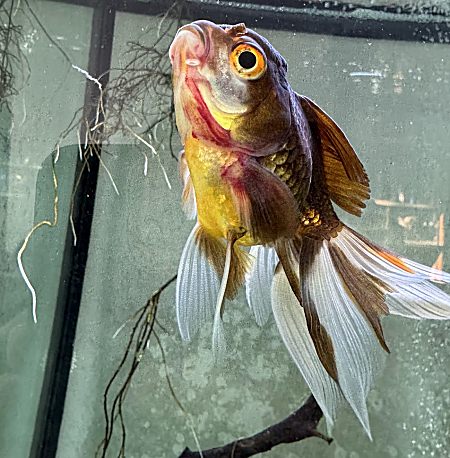| Back to Back Issues Page |
 |
|
The Goldfish Gazette, Issue #135 Sick Fish Queries March 29, 2025 |
Goldfish Care TipsA Free Monthly Resource For Goldfish Enthusiasts In This Issue Trying to diagnose what ails a sick fish remotely is very difficult but is made much easier if basic information is provided. Sick Fish Queries
Ryukin with bacterial skin inflammationI get many emails from readers requesting help with their fish that has suddenly developed an ailment or they have noticed a gradual change that seems to be worsening.Not providing some basic information means the diagnosis and treatment time will be extended, especially if different time zones are involved. Some diseases are very fast-acting, such as protozoan parasites that can kill within 3 days, which doesn't leave much time to start treatment. Sometimes, just gathering a list of facts before making contact may be enough to realize what the problem is yourself. Here is a list of facts that prove useful for diagnosing sick fish and why: Setup OverviewThe aquarium size, filter type, and capacity, together with a list of fish numbers, will indicate if the filter is adequate for the job.If the aquarium contains non-goldfish species, they could be a source of attack, especially Plecostomus or Bristle Nose catfish. Water ParametersPh – Water acidity or alkalinity levelEven though water may be spotlessly clean, the pH can be dangerously high or low, lowering the fish's immune defenses. Red patches on the body or fins are an early indication. Ammonia level Nitrates level Water ChangesThe frequency and water volume changed gives clues to possible water quality issues. Also, are the water changes based on testing, or just a guess that they are adequate?Recent ChangesMany disease outbreaks follow a recent change. The most common causes are newly introduced fish, snails, or plants that haven't gone through a proper quarantine or sterilization process.The problem usually surfaces about two weeks after their introduction to the aquarium. Changes to feeding, such as a different food, can cause rapid pollution problems if your fish are slow to accept the new food. Such changes must be made gradually. Age of FishThe age of a fish is important if it appears to be slowly swelling. Young fish rarely get some ailments such as internal tumors or cystic kidneys, but a fish 8 or 9 years old certainly can. A young female swelling is more likely to have an egg impaction problem than a tumor.Photo/video EvidenceProviding a photograph or, better still, a video of the sick fish and setup is highly advantageous to a speedy diagnosis and treatment.Salt Bath ImmediatelyAs I have often repeated, as soon as a fish is observed as having some health issue, isolate it, provide clean, fresh, aerated water, and add aquarium salt at 0.3% solution (a tablespoon per gallon or 3-4 grams per liter).By doing this, you have eliminated poor water quality and attacks from other species that could have caused the problem, and salt will cure 90% of Goldfish ailments. Remember, plain 100% un-iodized cooking salt from the local food market is a much quicker source of salt than waiting for a delivery from Amazon of some much more expensive aquarium salt. If there is a rapid improvement in the fish's health, you know the solution, but you still need to identify the cause of the problem otherwise, it will repeat itself shortly after the fish is re-introduced back into its aquarium. Comments? Ideas? Feedback? I'd love to hear from you. Just reply to this e-zine and tell me what you think, or what topics you want to be covered. www.facebook.com/aboutgoldfish |
| Back to Back Issues Page |
